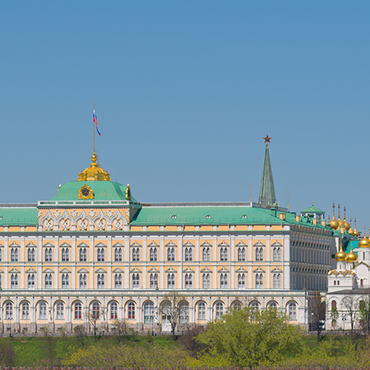U.S. teams with unexpected new cyber ally
The United States and Russia put aside differences on some issues to join forces in cyberspace.

The Kremlin, the White House's unlikely ally in the battle against cyber threats.
The United States is pushing forward in bilateral cooperation efforts with Russia that build on Cold War-era strategies and, officials hope, strengthen the countries' global cybersecurity stances. But will the renewed, digital-era alliance have broader implications?
News of the U.S.-Russian agreement came out of the recent G-8 summit held in Northern Ireland, where President Barack Obama and Russian President Vladimir Putin notably disagreed on the conflict in Syria and other high-profile issues. The two did, however, establish plans to improve cyber collaboration and foster trust between the two countries, according to a June 18 White House fact sheet.
"Our two nations now are leading the way in extending traditional transparency and confidence-building measures to reduce the mutual danger we face from cyber threats," the fact sheet notes. "These kinds of exchanges are important to ensuring that as we develop defense policy in this dynamic domain, we do so with a full understanding of one another's perspectives."
The information and communications technology security cooperation agreement involves an emphasis on increased dialog between senior officials. It includes the creation of a new working group between the two countries that will focus on identifying information and communication technology threats and coming up with potential solutions. The group is set to begin work within 30 days.
Other plans include steps in confidence-building "designed to increase transparency and reduce the possibility that a misunderstood cyber incident could create instability or a crisis in our bilateral relationship," according to the fact sheet.
Among the steps are the formation of links between the U.S. Computer Emergency Response Team and its Russian counterpart to exchange cybersecurity information. The two governments additionally are reviving Nuclear Risk Reduction Center links created in 1987 between the United States and the former Soviet Union that will allow access to each other's authorities on potential cyber incidents.
Another Cold War-era relic making a digital-era comeback is the so-called nuclear hotline, an already established direct communications system to be used in case of a security crisis.
"There have been ongoing efforts to apply concepts leftover from the nuclear era, transferring them to this era. For the most part it's led to mistakes, bad policy decisions and confusion – such as [the strategy of] deterrence being applied from the nuclear age to the cyber age," said Scott Borg, director and chief economist of U.S. Cyber Consequences Unit, an independent research firm. "In this case, ironically, it works."
The collaboration provides both countries with a number of benefits, Borg said: It could influence negotiations with China, since the U.S. and Russia both are on the receiving end of Chinese cyber theft. The same could go with other cyber adversaries – hacktivists, third-world cyber criminals and other international sources targeting both countries. There also could be immediate consequences since Russia has a proven track record of being able to quickly change its approach to cyber attacks, Borg added.
Still, despite the advantages, limitations in cooperation likely remain, according to Borg.
"The most important cyber attacks coming from Russia are being launched by criminal organizations that are unlikely to be subdued," Borg said, noting that cyber crime is heavily entrenched in Russian government and politics, with cyber militias offering leaders critical strategic leverage. It's also ingrained in the culture and economic welfare, providing significant revenue to the country. "The Russian government is not likely to interfere with this activity any time soon."
Nonetheless, the leaders emphasized the agreement as a key step forward, and were optimistic regarding future progress.
"By working together, we not only increase security and prosperity for the Russian and American people, but also help lead the world to a better place," Obama said, according to a Defense Department release.





